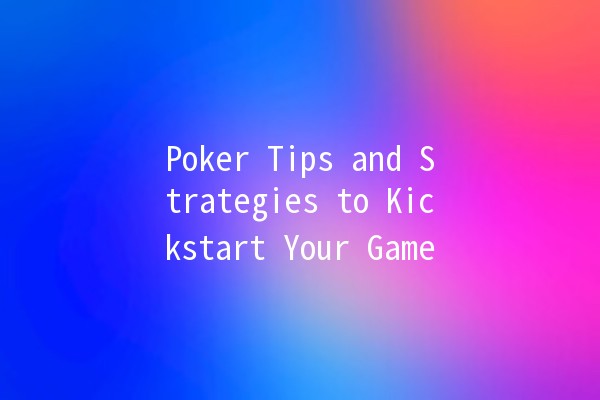If you're new to the world of poker, entering the game can seem overwhelming. With countless variations of poker, each with its own rules and strategies, beginners often find themselves wondering where to start. This article outlines essential tips and strategies for new players to grasp the fundamentals of poker and enhance their skills over time.
Understanding the Basics of Poker
Before diving into advanced techniques, it's crucial to familiarize yourself with the core concepts of poker. Poker is a card game that combines elements of skill and chance, where players compete to win chips or money by forming the best possible hand or convincing opponents to fold.
There are several dominant poker variations, with Texas Hold'em being the most popular, followed by Omaha, SevenCard Stud, and more. Each game has its unique set of rules, but they all share essential features, such as betting rounds and hand rankings.
Key Terms to Know
Blinds: Mandatory bets in Texas Hold'em that create a pot for players to win.
Community Cards: Shared cards placed on the table that players can use to form their hands.
Pocket Cards: The two private cards dealt to each player in Texas Hold'em.

Flop: The first three community cards revealed simultaneously.
Turn: The fourth community card.
River: The fifth and final community card.
Skill Enhancement Techniques for Beginners
As a beginner, improving your poker skills will require practice, patience, and a strategic mindset. Here are five effective techniques to help enhance your poker productivity.
Begin with fundamental strategies that focus on tight and aggressive play. This means playing fewer hands but betting aggressively when you decide to get involved. For instance, if you're dealt AK suited, it's a strong hand worth raising; conversely, avoid hands like 72 offsuit unless you're feeling adventurous.
Example Application: Play selectively during the initial phases of the game. If you’re consistently folding weak hands, you may find yourself in a better position when it's time to push with stronger holdings.
Understanding the significance of your position at the table is crucial. Being 'in position' means acting last during betting rounds, which gives you the advantage of seeing how other players react before making your decision.
Example Application: If you are in the 'late position' and notice several players have folded, feel free to raise with a wider range of hands compared to when you are under the gun. The information gleaned from others’ actions allows you to make informed decisions.
Proper bankroll management is vital to your longterm success in poker. Only play with money you can afford to lose and set aside a specific amount for your poker games.
Example Application: If your bankroll is $500, consider playing at a stake that allows you to have at least 20 buyins worth of that game. This ensures that even during bad runs, you won't deplete your funds too quickly.
Familiarizing yourself with poker hand rankings can help significantly in making quick decisions during the game. The standard poker hand rankings from highest to lowest are:
Example Application: While playing, keep a cheat sheet or quick reference on hand rankings for easy recall, especially in tense moments.
Improving your game isn't solely about your cards. Pay attention to your opponents' playing styles and tendencies. Identify who plays aggressively, who is passive, and who tends to bluff often.
Example Application: Take notes during your play sessions. If you notice a player frequently raises preflop and shows down weak hands, consider calling them down more often with decent hands.
Common Questions for Beginners
What should I do if I have a strong hand?
When holding a strong hand, focus on building the pot. You can achieve this by making strategic bets to entice opponents into calling. If you perceive your hand is strong, consider increasing the bet to extract more value.
How can I manage my emotions during a game?
Poker can be an emotional rollercoaster. Practice mindfulness techniques, such as deep breathing, to remain calm during tumultuous moments. Recognize the importance of taking breaks, especially if you find yourself becoming frustrated or overexcited.
Is bluffing necessary for beginners?
While bluffing can be an essential part of poker, new players should focus on understanding their fundamental shape before attempting it. Once you grasp the dynamics of the game, incorporate calculated bluffs into your strategy based on opponent tendencies.
What are some mistakes to avoid as a beginner?
Common mistakes include playing too many hands, failing to respect position, and neglecting bankroll management. Focus on quality rather than quantity, and only engage in hands where you have a reasonable chance of winning.
Can I play poker online as a beginner?
Absolutely! Many online platforms cater to beginners and allow you to practice in lowstakes games where you can hone your skills without significant financial risk.
Should I join a poker club or community?
Joining a poker club or online community can significantly support your progress. Engaging with likeminded individuals allows for discussions, learning, and even practice matches against others who share your passion.
al Thoughts
Embarking on your poker journey can be exciting and daunting. By understanding the principles of the game, mastering fundamental strategies, and continually refining your play, you’ll soon become a confident and skilled poker player. Whether you choose to sit at a live table or play online, remember that every hand dealt is an opportunity for learning and improvement. Good luck at the tables!